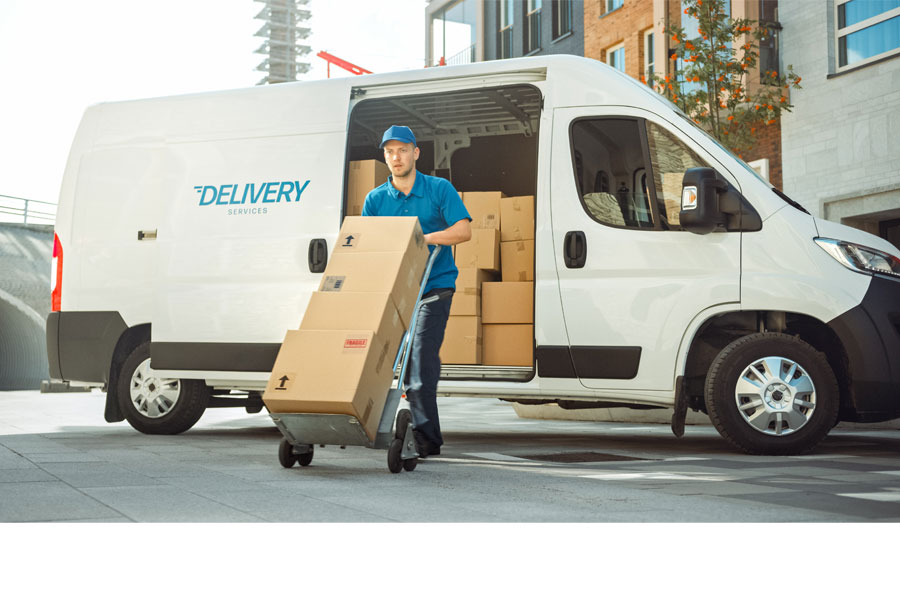In the dynamic realm of e-commerce, delivering your products swiftly and securely isn't just a goal—it's a necessity. As the market grows, so does the complexity and variety of parcel carriers. Instead of feeling overwhelmed, let this guide light your path. Dive in and discover how to choose the best parcel carrier for your e-commerce business, ensuring timely deliveries and ecstatic customers every time.
Understanding Your Typical Shipment Sizes and Product Types
Hello, budding e-commerce mavens! Before making a leap into the vast ocean of parcel carriers, it's pivotal to lay the groundwork. The cornerstone of this foundation? Understanding the dimensions and nature of your shipments. Here's how to go about it:
-
Begin with Basics: Know Your Parcels
Kick-off by categorizing your products based on size and weight. This will serve as the compass guiding you toward the right carrier:
- Petite Parcels: These are your small, often lightweight items. Carriers like USPS tend to shine here, offering competitive rates for these packages. Their first-class mail or priority mail can be a boon for these parcels.
- Mammoth Movers: These are the big boys of the shipment world. Think big and bulky items that generally need extra care. FedEx and UPS are often the front-runners for these, thanks to their expertise in handling and delivering bulky goods efficiently. However, there are many great final mile providers of big and bulky deliveries. With enough volume or a need for local deliveries in certain cities, these can be great options to provide a white-glove experience for your customers
-
Product Type: Fragile, Perishable or Standard?
Dive deeper into the nature of your products:
- Fragile Items: If you’re shipping glassware, electronics, or anything that can break easily, you need a carrier with a reputation for gentle handling. Some carriers offer specialized packaging solutions for fragile items.
- Perishable Goods: Selling gourmet chocolates or fresh produce? Time is of the essence! Consider carriers that offer refrigerated transport or expedited shipping options to ensure your product remains fresh.
- Standard Items: These are your everyday items that don’t require special handling. Most carriers are equipped to handle these efficiently. However, rates and delivery times can vary, so it’s always good to shop around.
-
Special Requirements
Sometimes, our products have unique needs:
- High-Value items: If you're shipping luxury goods or high-value electronics, you might need additional insurance or a signature upon delivery.
- Oversized items: Some carriers have size restrictions or additional fees for items beyond standard dimensions.
-
Insights from Industry Veterans
When it comes to e-commerce shipping, you rarely have to reinvent the wheel. Find experts and industry leaders who have grown successful e-commerce businesses and study how they’ve tackled shipping. Join e-commerce forums, attend webinars, or simply network with fellow e-commerce business owners. Their experiences can provide insights into which carriers handle specific product types best, which fulfillment providers could help your business most, and what software made their operations more efficient, and which strategies might offer you the competitive edge in logistics and customer satisfaction that can define the success of your business in the crowded marketplace of e-commerce.
Pro Tip: USPS's guide on package sizes is an excellent resource to start with. It not only helps in categorizing your parcels but also provides insights into how different product sizes and types can affect your shipping rates.
Remember, the relationship with your carrier is not a fleeting one. While it can be advantageous to evaluate your shipping rates regularly, you will still likely need multiple carriers and it is best to keep great long-term relationships with carriers that have been reliable for your business. Understanding your shipment sizes and product types is the first step in forging this lasting and fruitful partnership. So, take the time, do the groundwork, and set the stage for shipping success!
Pinpoint Your Destination: National, Regional, or International?
Navigating the world of e-commerce is like being a ship captain. You need to know your ports of call to set the right course. This starts with understanding your customer footprint. Where are you shipping to most often? And does that present an opportunity to work with a carrier that specializes in that area?
-
Staying Local: National and Regional Deliveries
- Benefits of Staying Local: By opting for local carriers or strong regional players, you often get quicker deliveries, better rates, and localized customer service.
- Regional Specialists: Some carriers excel in specific regions. For instance, some regional carriers might be most reliable around their sortation centers, but struggle with delivery times as they get further away.
-
Going Global: International Deliveries
- Global Players: Carriers like FedEx and DHL have robust international networks. They're adept at handling customs, duties, and international regulations.
- Localized International Carriers: In some cases, partnering with a local carrier in your customer's country can be more efficient for last-mile delivery. If you have many international shipments or would like to grow that portion of your business, then it can be valuable to work with a company that specializes in international shipping.
Pro Tip: Always keep an eye on customs regulations, duties, and taxes for international shipments. Carriers can provide guidance, but it's your responsibility to ensure compliance.
Mirror Tactics: Check How Similar Businesses Ship
Standing on the shoulders of giants (or at least, those a step or two ahead) can provide a clearer view of the landscape.
-
Networking
- Industry Events: Attend conferences, trade shows, or webinars. Direct conversations can yield invaluable insights, especially when you can discuss how to solve particular challenges with your shipping and logistics.
- Online Forums: Platforms like Reddit or niche ecommerce forums can be goldmines of shared experiences. They can be a great source for detailed reviews of carriers, software systems, fulfillment providers and more.
- Industry Events: Attend conferences, trade shows, or webinars. Direct conversations can yield invaluable insights, especially when you can discuss how to solve particular challenges with your shipping and logistics.
-
Competitive Analysis
Understanding your competition in-depth is crucial for any e-commerce business. One of the most effective and direct methods to achieve this is through mystery shopping. Here’s how it can be beneficial:Mystery Shopping: This involves posing as a regular customer and buying a product from your competitor. By doing so, you can gain first-hand insights into various aspects of their service.
By conducting a mystery shopping exercise, you'll not only identify where your competitors excel but also uncover potential gaps in their service. These insights can guide your strategies, helping you capitalize on areas where you can outshine the competition.
- Packaging:
- Quality: Does your competitor use sturdy, high-quality materials? Or do they opt for more eco-friendly, sustainable packaging?
- Presentation: The unboxing experience can significantly influence customer perception. Is their packaging aesthetically pleasing and branded effectively? Does it include any promotional material or personalized notes?
- Protection: How do they ensure the product doesn’t get damaged in transit? Are there fillers, bubble wrap, or other protective materials used?
- Quality: Does your competitor use sturdy, high-quality materials? Or do they opt for more eco-friendly, sustainable packaging?
- Shipping Speed:
- Duration: How long does it take for the product to reach the customer? Do they offer expedited shipping options?
- Reliability: Do they consistently meet their estimated delivery dates? Are there any unexpected delays or issues?
- Duration: How long does it take for the product to reach the customer? Do they offer expedited shipping options?
- Packaging:
Service Level Requirements: It's Not Just About Speed
Shipping isn't a one-size-fits-all endeavor. Tailor your approach based on customer needs and product type.
-
Ground Shipping
- Advantages: Cost-effective and reliable for non-urgent deliveries.
- When to Use: Ideal for standard items without time-sensitive delivery windows.
- Advantages: Cost-effective and reliable for non-urgent deliveries.
-
Expedited Shipping
- Advantages: Faster than ground but doesn't carry the premium price of next-day shipping.
- When to Use: For time-sensitive items, especially during holiday seasons or promotions.
- Advantages: Faster than ground but doesn't carry the premium price of next-day shipping.
-
Next-Day Shipping
- Advantages: It's the Ferrari of shipping options. Gets the package to the customer ASAP!
- When to Use: For very urgent orders, high-value items, or perishables with a short shelf life.
- Advantages: It's the Ferrari of shipping options. Gets the package to the customer ASAP!
Integration Needs: The Tech Behind the Scenes
Your shipping process should be a well-oiled machine. Seamless integration is the key.
-
Shopping Cart Platforms
- Compatibility: Ensure the carrier integrates smoothly with the platforms your company sells on like Shopify, Magento, WooCommerce, Amazon, eBay, etc.
- Real-Time Rates: Customers appreciate seeing live shipping rates when checking out. Most shopping carts support offering multiple carrier options, integrating to your rates, and creating rules for when you offer free shipping.
- Compatibility: Ensure the carrier integrates smoothly with the platforms your company sells on like Shopify, Magento, WooCommerce, Amazon, eBay, etc.
-
Sales Channels
- Diverse Platforms: From Amazon and eBay to Facebook Marketplace, ensure that you have systems that work with all your necessary platforms and create the correct labels. Amazon Prime Sellers, for example, need to make sure their orders are processed through the Amazon Shipping API.
-
Internal Software
- Inventory Management: Real-time tracking of stock levels is vital for many businesses selling on multiple sales channels or operating out of multiple warehouse locations. Inventory management can be very challenging, but there are many great software systems that specialize in simplifying your inventory management.
- Order Management: Efficiently process orders, from manufacturing, vendor management, and inventory placement to delivery by finding the right order management system for your needs. Some order management systems offer inventory management, while others integrate with systems that do.
- Inventory Management: Real-time tracking of stock levels is vital for many businesses selling on multiple sales channels or operating out of multiple warehouse locations. Inventory management can be very challenging, but there are many great software systems that specialize in simplifying your inventory management.
Direct Account or Reseller? Size Does Matter
The scale of your e-commerce operations can significantly influence your choice between a direct account with a carrier or partnering with a reseller. But it's not just about size; it's about leveraging the right resources to maximize your shipping advantages.
-
Direct Account
For businesses that have grown substantially and possess the clout to hold significant negotiations:
Advantages:
- Tailored Rates: Larger businesses have the bargaining power to negotiate tailor-made rates based on their shipping volumes, service level needs and typical package profile.
- Customized Terms: A direct relationship can lead to terms and conditions that cater specifically to the business’s unique requirements, ensuring more control over the shipping process.
-
Reseller Account
For emerging businesses or those that might not have the volume yet for the best custom rates direct from a carrier:
Advantages:- Collective Bargaining: By joining forces with a reseller, small to mid-sized businesses can harness the combined shipping volume of multiple companies. This collective strength can lead to maximum shipping discounts available to companies of their size.
- Discounted Rates with Jillamy: As one of the top-tier resellers, Jillamy has established strong relationships with major carriers. This long-standing alignment enables Jillamy to secure discounted rates, which are passed on to their partners, ensuring you get the cost-efficiency you seek.
- Value-added Services: Jillamy doesn’t just offer competitive rates. Our reseller programs come packed with additional services like a dedicated account rep, customer support, simplified invoicing, insurance options, and expert consultation on logistics and supply chain needs.
- Ease of Management: With Jillamy's carrier reseller programs, you get a streamlined shipping process. No need to juggle multiple carrier accounts or navigate complex logistics on your own; Jillamy's experienced team guides you every step of the way.
- Collective Bargaining: By joining forces with a reseller, small to mid-sized businesses can harness the combined shipping volume of multiple companies. This collective strength can lead to maximum shipping discounts available to companies of their size.
While direct accounts can offer larger businesses the luxury of custom rates and terms, Jillamy's reseller programs are a beacon for small to mid-sized enterprises. By partnering with Jillamy, you gain the advantage of our vast network, industry expertise, and dedicated support, ensuring that your shipments are in the best hands.
Reviewing Proposed Rates/Agreements: The Devil's in the Details
It's easy to get lost in the excitement of new proposed discounts, but always tread with caution and make sure you have carefully considered all the details on a new proposed carrier agreement.
-
Hidden Fees
- Watch Out: Most carriers have minimum charges, fuel surcharges, weekend delivery fees, or residential delivery charges. Make sure you understand how all the additional fees work and request a competitive analysis on your shipping history to see exactly how the new rates stack up.
-
Volume Commitments
- Flexibility vs. Discounts: Some carriers offer discounts for volume commitments. Ensure you can meet these without straining your operations. It can be tempting to base your decision on where you think your business will be in a year or two, but carrier contracts that offer tiered pricing requiring your business to double or triple your shipping volume are unlikely to be the best deal for you now.
-
Peak Season Surcharges
- Stay Alert: During busy seasons, most carriers hike their rates and have additional peak season fees or high-demand surcharges. Track these closely with all your carriers. It is certainly possible that your company will reduce your shipping costs by changing carriers during peak season or splitting your shipping volume.
The Power of a Multicarrier Approach
Diversifying your carrier portfolio can offer flexibility, resilience, and potential cost savings.
-
Flexibility in Shipping Options
- Multiple Choices: Offer customers a range of delivery options, from economical to express. Many customers will just choose the cheapest option, while others might prefer a certain carrier or opt for expedited delivery. No More Bottlenecks: If one carrier is overwhelmed, another can pick up the slack. The pandemic was probably the first time many companies ever had carrier limitations on the number of packages they could ship, but this same strategy can be valuable during peak season.
-
Greater Capacity During Peak Seasons
- No More Bottlenecks: If one carrier is overwhelmed, another can pick up the slack. The pandemic was probably the first time many companies ever had carrier limitations on the number of packages they could ship, but this same strategy can be valuable during peak season.
-
Competitive Rates
- Playing the Field: By using a multi-carrier approach to shipping, you can track costs and performance. This makes it easier to create automation rules in many shipping software systems so imported orders default to the best carrier and service level for each shipment.
Choosing the right shipping strategy is akin to setting the sails correctly on a ship. With the right choices, you'll not only reach your destination but enjoy the journey along the way. Happy shipping!
Navigating the Waters of E-commerce Parcel Carriers with Confidence
E-commerce shipping isn't just about transporting products; it's about delivering promises, trust, and experiences to your customers. By understanding your shipment sizes and product types, pinpointing your shipping destinations, observing market peers, defining service level requirements, ensuring seamless technological integration, and smartly choosing between direct and reseller accounts, you lay a robust foundation for your shipping strategy. Further, the meticulous review of rate agreements and adopting a flexible multi-carrier approach can enhance resilience and efficiency, ensuring your business is well-equipped to navigate any storm.
As you chart your course in this vast ocean of e-commerce opportunities, remember that the right choices can make waves in customer satisfaction and loyalty. While the myriad of options might seem daunting, breaking down the decision-making process into manageable steps, as outlined in this guide, can simplify the journey. And if ever in doubt, lean on industry peers, or consider partnering with logistic experts like Jillamy to make your shipping ventures smooth sailing. Here's to reaching new horizons and delivering excellence, one parcel at a time!
At Jillamy, we understand the nuances of small parcel carrier rates and the significance they hold in your e-commerce success. Allow us to be your navigational beacon, offering exclusive carrier discounts and tailored logistic solutions that ensure your products not only reach their destinations cost-effectively but also carry your brand's promise of excellence and reliability every step of the way. Contact us today at 800-592-7449 or schedule an appointment on our contact us page.



